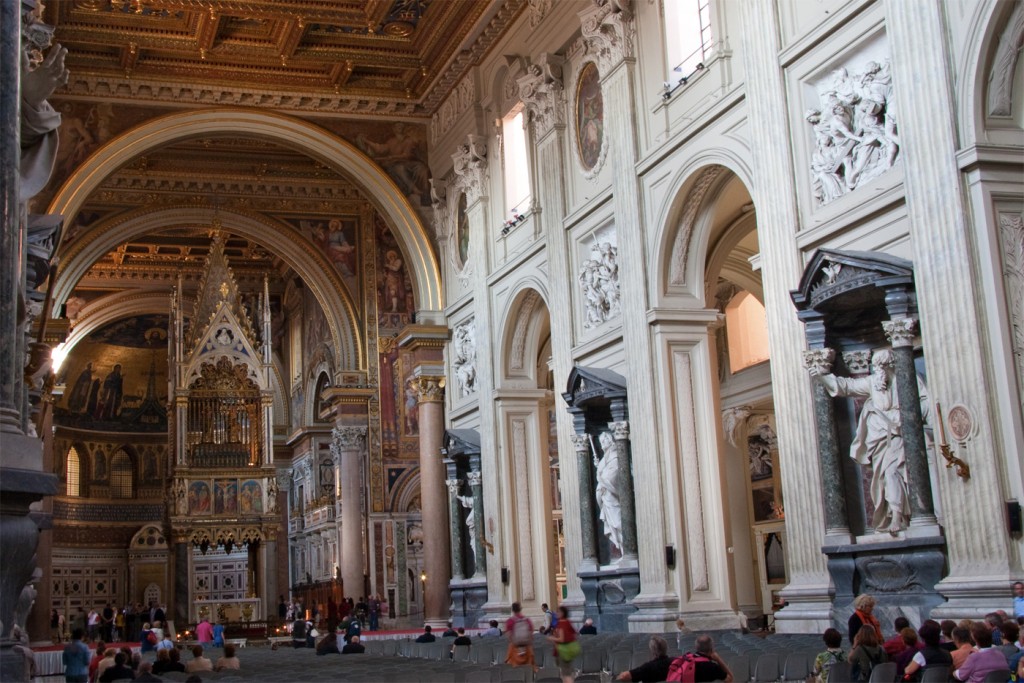The Temple and Worship
The Dedication of the Lateran Basilica
In all of today’s readings, the temple is prominently mentioned. Ezekiel speaks of streams of living water flowing out from the temple, watering the desert, bringing life to all living things, offering fresh healing to God’s people. Paul reminds the Corinthians that their faith rests upon the firmest of foundations, Christ himself. More than that, Paul reveals that those who follow Christ are themselves temples, temples of the Holy Spirit; that is, God dwells not only with them, but in them. For the Jews of Jesus’ time, the temple had come to be identified with the presence of God and the only place where authentic worship of God took place. Jesus had a different perception. Jesus identified himself not with the temple, but as the temple. In so doing, Jesus indicated a dramatic shift in what it means to worship God, to be in God’s presence. No longer was a place to be the focus of prayer. Instead, a person, the person of Jesus Christ, becomes the center of our worship.

Let’s Reflect on God’s Word
First Reading: I saw water come out of the temple. It was water that gave life and fertility (Ez 47: 1-2, 8-12)
Psalm: Let us go rejoicing to the house of the Lord. (Psalm 121)
Second Reading: You are God’s temple (1 Cor 3: 9-11, 16-17)
Gospel: Jesus spoke of the temple of his body (Jn 2: 13-22)
Dear brothers and sisters, Today, November 9, we Catholics celebrate the feast of the Cathedral of St. John Lateran. The word “cathedral” comes from “cathedra” i.e., a place in which teaching occurs. As we also refer about the university cathedra, for example. And who are those offering education to the people of God in the Church? First and foremost the Bishops as successors of the Apostles, the apostles are witnesses to the truth of Jesus Christ, the truth which was manifested in his resurrection.
The place from which a bishop is taught is the cathedral that is why there is only one cathedral in each diocese or archdiocese. However, within the Apostles of Jesus Christ it was his will that there would be one. The only one who said, “I have prayed for you that your faith may not fail. And when you turn back to me strengthen your brothers.” (Lk 22:32).
Peter established his last and final mission in the Roman Empire in the capital, in the city that was the head of the empire, and that was to become, by the death of Peter the testimony of Peter in the Catholic Diocese quintessential world.
Living God’s Word
Living with self-inflicted limitations is no easy task, personally or ecclesially. On the other hand, the presence of the Lord Jesus Christ renews the Church and helps us to build his kingdom as best we can.
Readings for the Week
Monday: Ti 1:1-9; Ps 24:1b-4ab, 5-6; Lk 17:1-6
Tuesday: Ti 2:1-8, 11-14; Ps 37:3-4, 18, 23, 27, 29; Lk 17:7-10
Wednesday: Ti 3:1-7; Ps 23:1b-6; Lk 17:11-19
Thursday: Phlm 7-20; Ps 146:7-10; Lk 17:20-25
Friday: 2 Jn 4-9; Ps 119:1-2, 10-11, 17-18; Lk 17:26-37
Saturday: 3 Jn 5-8; Ps 112:1-6; Lk 18:1-8
Sunday: Prv 31:10-13, 19-20, 30-31; Ps 128:1-5; 1 Thes 5:1-6; Mt 25:14-30 [14-15, 19-21]
Saints & Special Observances
Sunday: The Dedication of the Lateran Basilica
Monday: Thirty-second Week in Ordinary Time; St. Leo the Great
Tuesday: St. Martin of Tours; Veterans Day
Wednesday: St. Josaphat
Thursday: St. Frances Xavier Cabrini
Saturday: St. Albert the Great; Blessed Virgin Mary
Good News
Let us be more careful to keep clean our parish clean, avoid littering and/or pasting gum in the pews …
I want everyone to ask themselves, do I come to church on God’s terms or on my own terms? Do I arrive late and do not take the sign of the cross seriously? Do we sit in the back of the church or in the corners and do not allow for others to come and sit in the empty spaces? We have Christ present in various ways when we as God’s people go to church.
We have a God who sees all and knows our thoughts. Would we like to be treated in the way we treat the Eucharist? Why put a distance between God and ourselves when we sit in the back of the church? As a community of faith, there is much goodness, participation, and collaboration in Mary Immaculate. If we do not work to be our best then what we have progressed will spoil. Make the effort to arrive early to church and participate throughout the Eucharistic celebration.
Treasures from Our Tradition
For several weeks, we have considered penance as a sacrament of forgiveness, and yet there are two other sacraments in this category. The first, of course, is the Eucharist itself. The other is the sacrament of the sick, long associated with penance. The Letter of James sets out the deep tradition for caring for the sick: sending for the priests, who will pray and lay their hands on the sick ones, anointing them with oil, and giving them forgiveness. Long before other rites of penance developed, the sacrament of the sick was therefore a profound experience of forgiveness. Jesus often healed the sick, nearly always as a visible sign of forgiveness of sin. The tradition didn’t unfold smoothly, however, and within a few centuries the oil of the sick was taken home to be applied by caregivers as a salve, or even to be drunk as a medicine. As early as the second century, bishops were therefore urging that priests should be the ones to visit those separated by illness from the Sunday assembly. Thus the practice of consigning the Eucharist and the oil of the sick to the non-ordained faithful to bring home was relatively short lived.
